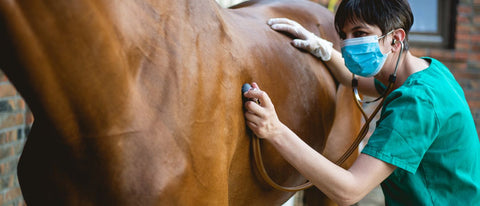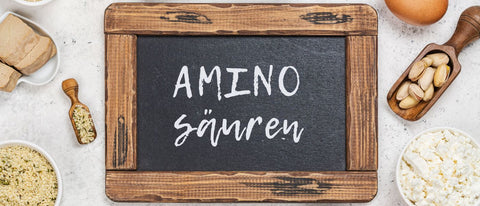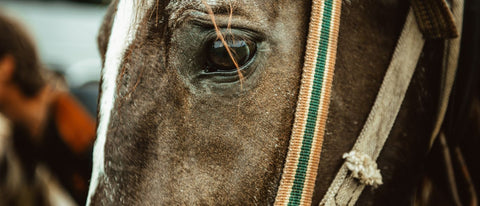
Florian ist aufgewachsen auf einem Bauernhof. Umgeben von Pferden, entdeckte er früh seine Faszination für diese majestätischen Tiere. Inspiriert von seiner reitbegeisterten Mutter, entwickelte er das Nahrungsergänzungmittel - Pferdegold. Seine tiefe Verbundenheit zur Natur und die leidenschaftliche Hingabe zu Pferden trieben ihn an, sein Unternehmen zu gründen.
Every horse owner is familiar with the concern for their animal's health. One issue that deserves special attention is bloat in horses – a condition that can be challenging for both the animal and the owner.
Just like in humans, a bloated stomach is very uncomfortable for horses. This guide provides valuable information on how to recognize bloated stomach in your horse, understand the possible causes, and help your horse with appropriate feeding and care.
With the right measures, you have the opportunity to significantly improve your horse's well-being.

Bloated stomach in horses: Everything you should know
A horse's bloated stomach can be more than just a temporary discomfort. It is often an indication of problems in the digestive system .
An appropriate diet and careful care can help reduce flatulence and promote your horse's well-being.
In this section, we'll show you how to recognize the signs of bloating and respond appropriately.
Our tips for preventing and dealing with flatulence aim to harmonize your horse's digestion.
How does digestion work in horses?
The horse's digestive system is long and sensitive , which makes it particularly susceptible to flatulence.
A distinctive feature is the slanted stomach entrance, which has a strong sphincter that prevents gas or spoiled food from leaving the stomach via the esophagus. This makes it virtually impossible for horses to burp to expel excess air or gas in their digestive system .
Unlike ruminants such as cows, where the fermentation chamber is located in the front part of the digestive tract, the horse's fermentation chamber is located in the cecum, far back in the digestive tract. This means that gases have to travel a long way ,
All reasons for flatulence in horses at a glance
1. Primary fermentation: Meaning & Characteristics
Primary fermentation refers to a disturbance in the horse's digestive process , which leads to unwanted and excessive gas formation.
This is caused by the fermentation of food in the intestines that should not normally ferment in such quantities.
Here are the main causes:
-
Excessive starch intake: Too much grain or diets rich in concentrated feed can disrupt the intestinal flora and lead to uncontrolled fermentation.
-
Sudden change in diet: Rapid changes in diet can overwhelm the digestive system and lead to fermentation problems.
- Poor feed quality: Spoiled or unsuitable feed can lead to digestive problems and unwanted gas formation.
2. Secondary fermentation: meaning & characteristics
Secondary fermentation occurs when existing digestive problems are exacerbated by additional factors. This type of fermentation is often the result of conditions that impede or alter the normal digestive flow.
The most common causes are:
-
Stress and anxiety: These factors can impair digestion and lead to bloating.
-
Physical problems: Diseases such as dental problems or stomach ulcers can affect food intake and digestion.
- Lack of exercise: A lack of regular exercise can impair bowel function and lead to digestive disorders.

Flatulence or colic: What is behind a bloated stomach in a horse?
If a horse has digestive problems, it is often described as "bloated" or even "gassy." A bloated stomach in horses can signal a serious health problem , so you shouldn't ignore these symptoms.
Flatulence in horses occurs when excessive gases accumulate in the digestive tract, which can lead to discomfort and pain.
While mild flatulence can usually be remedied by adjusting feeding , severe flatulence is a risk factor for colic.
Colic is a serious, often painful digestive disorder that requires immediate veterinary attention.
Therefore, you should learn to recognize the symptoms of a bloated stomach in your horse early on and act accordingly.
Signs and first symptoms of bloating in horses
The first signs of flatulence in horses can be subtle , but it is important to pay attention to them.
Here are some symptoms that may indicate bloating or digestive problems:
-
Noticeably large belly: If the horse has a large belly, this can be a sign of excessive gas accumulation in the digestive tract.
-
Increased intestinal sounds: Unusually loud or frequent intestinal sounds in horses can indicate digestive problems.
-
Frequent farting: If a horse farts noticeably often, this can be an indicator of increased gas formation in the intestines.
-
Restlessness or expressions of pain: A horse that shows signs of discomfort, such as pawing or rolling, may be suffering from bloat.
-
Reduced feed intake: A horse with digestive problems may show less interest in food or eat more slowly.
-
Changes in stool consistency: Abnormalities in stool, such as undigested food residue or a change in consistency, can also indicate digestive problems.
- Abdominal tenderness: If a horse is sensitive to touch in the abdominal area, this could be a sign of flatulence or other digestive problems.
Treating bloat in horses: What really helps?
To get rid of bloat in horses, it's important to identify the causes and take appropriate action. Appropriate feeding, avoiding stress , and regularly checking the quality of the feed are essential.
In cases of acute flatulence , gentle exercise can help relieve the gas. However, if symptoms persist or are severe, it is essential to consult a veterinarian. This is the only way to rule out serious health problems and provide your pet with targeted treatment.
Helpful feed for horses with bloating
Careful feed selection can be crucial in preventing and treating flatulence in horses.
Here are some food options that may be particularly helpful:
-
High-quality hay: Well-dried and mold-free hay can be essential for healthy digestion. It provides essential fiber, which ensures regular bowel movements.
-
Easily digestible concentrates: Avoid foods that are too starchy and instead choose products that are easily digestible. This can reduce stress on the digestive system and support intestinal health.
-
High-fiber food: Food with a high fiber content, such as beet pulp, can promote intestinal activity. Fiber is important for a healthy intestinal flora and can help reduce flatulence.
-
Herbal supplements: Certain herbs such as fennel, chamomile, or peppermint can be helpful. They are known for their soothing properties on the gastrointestinal tract.
- Oily seeds: Flaxseeds and chia seeds can aid digestion due to their mucilaginous consistency. They can help lubricate the digestive tract and facilitate the passage of food.

Perfect for your horse: Pferdegold® supplementary feed!
These specially developed supplements support your horse's diet and provide it with natural nutrients. Made in Germany, grain-free and drug-free, with a 30-day money-back guarantee.
Try it now!Improve intestinal health: tips & strategies
Healthy intestinal function is essential for your horse's well-being.
Here are some tips and strategies that can promote gut health :
✔ Regular feeding times: A consistent feeding schedule helps keep the horse's digestive tract at a regular pace. This can prevent digestive disorders and promote intestinal health.
✔ Sufficient exercise: Regular exercise is not only important for the horse's overall health, but also for stimulating intestinal activity. Exercise can promote blood circulation and support natural digestive processes.
✔ Stress reduction: Stress can negatively affect digestion. Try to minimize stress factors by creating a calm and consistent environment for your horse.
✔ Water access: Ensure your horse always has access to fresh, clean water. Adequate fluid intake can contribute significantly to digestion and also help prevent digestive problems.
✔ Check food quality: Check the quality of the food regularly. Spoiled or moldy food can lead to digestive problems and should be avoided at all costs.
Conclusion
Flatulence can significantly impair your four-legged friend's well-being. In more severe cases, what initially appears to be harmless gas can develop into serious gas colic.
It is therefore crucial to recognize the symptoms of flatulence in horses early and to interpret them correctly.
With the right diet, sufficient exercise, and minimizing stress factors, you can effectively support your horse's digestion before problems even arise.
FAQ
Can bloating be life-threatening in horses?
Yes, bloating in horses can be life-threatening under certain circumstances.
It's a condition that indicates serious digestive problems and, if left untreated, can lead to colic. Prompt and appropriate advice and treatment are therefore crucial.
It's important to recognize symptoms early and consult a veterinarian immediately if you suspect any complications. Preventive measures such as a balanced diet and regular exercise can reduce the risk of complications.
Can a horse with a bloated stomach be ridden?
Riding a horse with a bloated stomach is generally not recommended. Bloating can be a sign of discomfort or digestive problems, and riding could worsen the condition.
It is advisable to identify and treat the cause of the flatulence before riding the horse again. If unsure, always consult a veterinarian.
What role does stress play in flatulence in horses?
Stress can play a significant role in the development of flatulence in horses. Stress can impair digestion and lead to impaired intestinal function, which in turn can cause flatulence.
It is important to minimize stress factors by providing a calm and stable environment and exercising the horse regularly.
Important:
Pferdegold is not a substitute for veterinary diagnosis or treatment. The information contained in this article is for general informational purposes only and is intended to help improve your horse's well-being.Pferdegold products do not treat or cure diseases , but rather support your horse in compensating for nutritional deficiencies through targeted nutrient intake .
However, they are not a substitute for professional advice from a veterinarian or specialist. If your horse has any health problems, we strongly recommend consulting a veterinarian. Pferdegold assumes no liability for decisions made based on the information provided here.

















